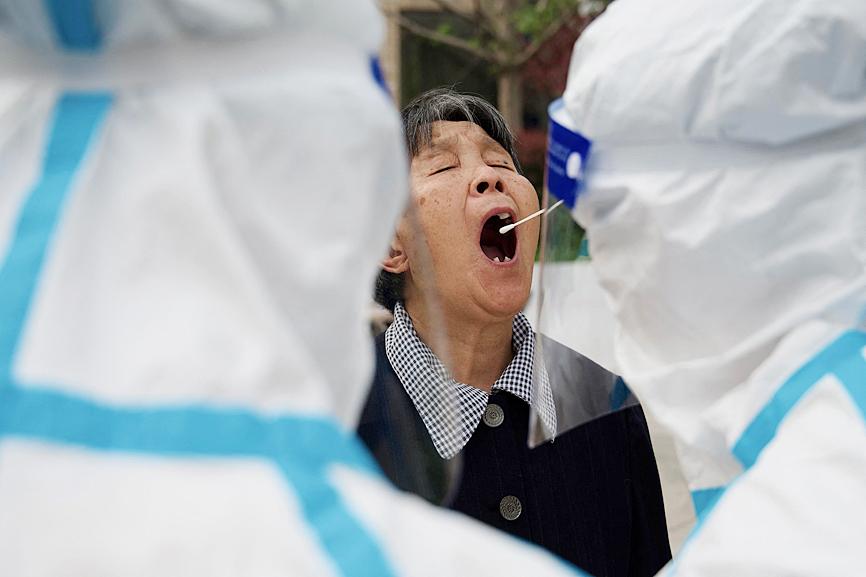Fears of a hard COVID-19 lockdown yesterday sparked panic buying in Beijing, as long lines for compulsory mass testing formed in a large central district of the Chinese capital.
China is already trying to contain a wave of infections in its biggest city, Shanghai, which has been almost entirely locked down for weeks and reported 51 new COVID-19 deaths yesterday.
Shanghai has struggled to provide fresh food to those confined at home, while patients have reported trouble accessing non-COVID-19 medical care — and the rising cases in the capital triggered fears of a similar lockdown.

Photo: AFP
Downtown Beijing’s most populous district Chaoyang, home to about 3.5 million people, ordered mass testing from yesterday for residents and those working there. The area hosts embassies and the headquarters of many multinational firms.
Lines snaked around malls and outside office complexes as people waited to be swabbed by health workers in protective gear.
“If a single case is found, this area could be affected,” said office worker Yao Leiming, 25, as he headed for a testing site with a group of colleagues.
The mass testing order, and warnings of a “grim” COVID-19 situation in the city, sparked a run on Beijing’s supermarkets overnight as residents rushed to stockpile essentials.
Many items on grocery delivery apps sold out on Sunday night after the testing order was announced, but stocks were replenished yesterday.
Beijing Center for Disease Control and Prevention Deputy Director Pang Xinghuo (龐星火) told a news conference that there had been 70 infections across half the city’s districts since Friday, adding that the “distribution area of infected people ... has expanded.”
Officials told residents not to leave the city during the five-day May public holiday or join group gatherings.
About 40 percent of yesterday’s scheduled flights from the capital’s airports were canceled, flight tracking data showed.
With fears that harsher measures were looming, Beijing resident Zhao picked up several bags of groceries, including eggs and fresh vegetables, from a store yesterday.
The 31-year-old said he wanted to make sure his toddler would have enough to eat if the family was ordered to stay at home.
“Adults can survive for a few days, but it’s not the same for children,” said Zhao, who only wanted to be known by his surname.
Wang, another supermarket customer, said she was concerned that “things will become like in Shanghai.”
“People are anxious... Everyone is snapping up goods and we’re worried that items might run out,” the 48-year-old said.
Her family had secured enough food to last a week, she added.
Local media also reported soaring sales of storage appliances in Beijing.
One online retailer told the Beijing Evening News that it sold 300 freezers on Sunday — the number normally sold in a month.
The city government on Sunday tried to ease fears, with an official saying supply and distribution was “stable.”
The capital reported 19 new infections yesterday — including asymptomatic cases — after a warning from authorities that the virus has been circulating undetected.
Beijing’s numbers pale in comparison with Shanghai, which has recorded more than 500,000 cases since March 1.
The economic hub of 25 million people is struggling to defeat China’s worst outbreak in two years.

CHAOS: Iranians took to the streets playing celebratory music after reports of Khamenei’s death on Saturday, while mourners also gathered in Tehran yesterday Iranian Supreme Leader Ayatollah Ali Khamenei was killed in a major attack on Iran launched by Israel and the US, throwing the future of the Islamic republic into doubt and raising the risk of regional instability. Iranian state television and the state-run IRNA news agency announced the 86-year-old’s death early yesterday. US President Donald Trump said it gave Iranians their “greatest chance” to “take back” their country. The announcements came after a joint US and Israeli aerial bombardment that targeted Iranian military and governmental sites. Trump said the “heavy and pinpoint bombing” would continue through the week or as long

TRUST: The KMT said it respected the US’ timing and considerations, and hoped it would continue to honor its commitments to helping Taiwan bolster its defenses and deterrence US President Donald Trump is delaying a multibillion-dollar arms sale to Taiwan to ensure his visit to Beijing is successful, a New York Times report said. The weapons sales package has stalled in the US Department of State, the report said, citing US officials it did not identify. The White House has told agencies not to push forward ahead of Trump’s meeting with Chinese President Xi Jinping (習近平), it said. The two last month held a phone call to discuss trade and geopolitical flashpoints ahead of the summit. Xi raised the Taiwan issue and urged the US to handle arms sales to

State-run CPC Corp, Taiwan (CPC, 台灣中油) yesterday said that it had confirmed on Saturday night with its liquefied natural gas (LNG) and crude oil suppliers that shipments are proceeding as scheduled and that domestic supplies remain unaffected. The CPC yesterday announced the gasoline and diesel prices will rise by NT$0.2 and NT$0.4 per liter, respectively, starting Monday, citing Middle East tensions and blizzards in the eastern United States. CPC also iterated it has been reducing the proportion of crude oil imports from the Middle East and diversifying its supply sources in the past few years in response to geopolitical risks, expanding

Pro-democracy media tycoon Jimmy Lai’s (黎智英) fraud conviction and prison sentence were yesterday overturned by a Hong Kong court, in a surprise legal decision that comes soon after Lai was jailed for 20 years on a separate national security charge. Judges Jeremy Poon (潘兆初), Anthea Pang (彭寶琴) and Derek Pang (彭偉昌) said in the judgement that they allowed the appeal from Lai, and another defendant in the case, to proceed, as a lower court judge had “erred.” “The Court of Appeal gave them leave to appeal against their conviction, allowed their appeals, quashed the convictions and set aside the sentences,” the judges